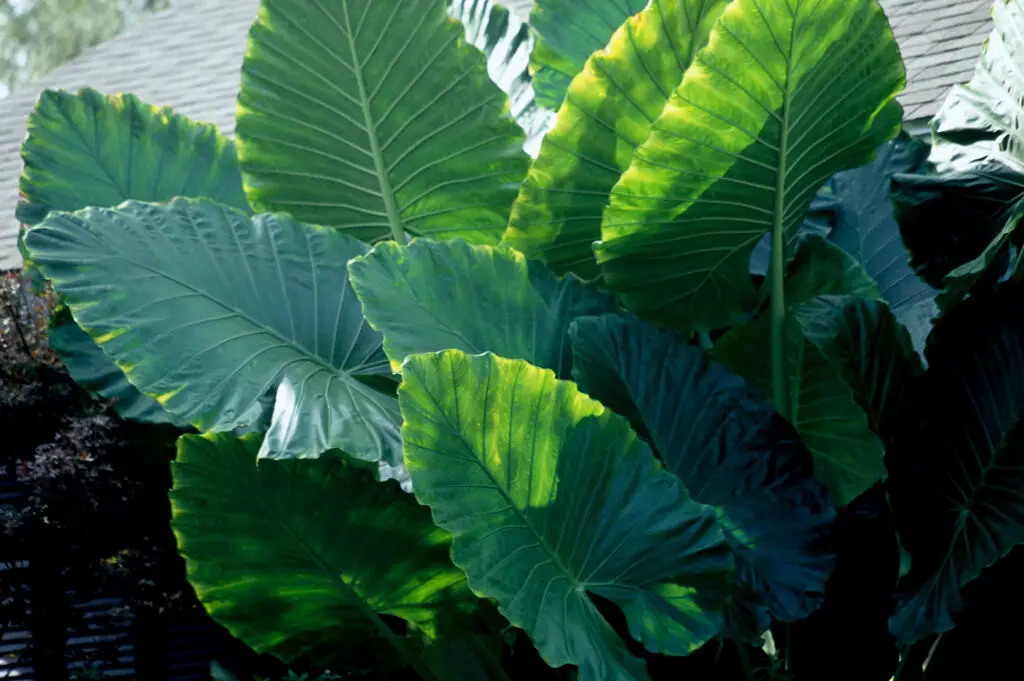The elephant ear is a tropical and subtropical decorative plant that grows in tropical and subtropical climates. It has large heart-shaped leaves and emerges from a potato-like bulb. These plants may be grown both indoors and outdoors. Keep in mind that these plants can only thrive in conditions that are conducive to their growth, such as wet soil, filtered sunshine, and sufficient nutrients. It’s vital to fertilize the elephant ear plant at the appropriate time and in the proper method to promote optimal development and health.
When Should Elephant Ears Plants Be Fertilized?
Here’s a list of questions to consider:
When Should You Fertilize Your Elephant Ears?
Elephant ears should be fertilized in the spring, summer, and early fall. In the winter and autumn, you should cease fertilizing to give your plants a break. Because it isn’t growing season, it’s best to keep the plants indoors and avoid fertilizing them.
What Is The Best Way To Fertilize Elephant Ears Indoors?
Cranberry Taro, Black Magic, Chicago Harlequin, and Black Stem are some of the Elephant Ear kinds that thrive indoors. These kinds often reach a height of 3 to 5 feet, which is a good size for indoor plants.
Elephant ear types reach a good size and require a lot of space to reach their full potential, so pick a container that can accommodate them. It’s best to go for a pot that’s at least 30-inches broad and 20-inches deep. Every two weeks, apply a 50 percent diluted liquid fertilizer. If you don’t dilute the fertilizer, though, you should apply it every twenty days. It’s also crucial to fertilize the Elephant Ear plants on a regular basis.
Best Homemade Elephant Ear Fertilizers
Homemade soil is far more helpful and cost-effective than store-bought soil. Homemade fertilizers are beneficial to soil health since they do not affect the soil structure or microbial population. Here are a few DIY or natural elephant ear plant fertilizers to try.
Compost Tea Fertilizer
Compost Tea is a natural liquid fertilizer that produces amazing effects when applied in the spring and summer. This fertilizer is simple to make at home using compost. The compost tea takes about twenty days to prepare.
Fill a burlap bag with compost and drop it in the water to produce compost tea. Depending on the compost content, the water will become yellowish to brown after twenty days. If the water begins to turn brown, dilute it before using it on the plants.
Water from an aquarium or a fishbowl
It’s also a good idea to use fishbowl water to fertilize your elephant ear plants. When you clean the fishbowl, save the water and add two cups of water per plant every two weeks.
Commercial Fertilizers of the Highest Quality
Commercial fertilizers can help your plant reach its full potential quickly. However, you must exercise extreme caution this time, since even a slight error might result in the death of your plants. To achieve the greatest results, it’s important to stick to a fixed timetable and utilize a certain amount of fertilizer.
All-Purpose Liquid Fertilizer 20-20-20
It’s a premium all-purpose liquid fertilizer that you may use on your elephant ear plants every two weeks. It’s a general-purpose fertilizer that may be used at any stage of plant growth.
Slow Release Mix 20-10-20
It’s a water-soluble magnesium slat fertilizer that keeps the most slats in the soil for a long period. This fertilizer will assist your plants throughout the winter months when you don’t fertilize them. This fertilizer should be used every three weeks for growing plants and once a month for fully developed plants.
Tips on Fertilization
If you’re using organic fertilizer, you should apply Epsom salt on a regular basis to keep the soil’s nutritional balance in check. Natural and homemade fertilizers aren’t high enough in salts to meet the elephant ear’s needs. To preserve soil health and plant development, it’s also a good idea to use both natural and commercial fertilizers on a regular basis.
Frequently Asked Questions
Which fertilizer is best for elephant ear plants?
The ideal fertilizer for elephant ear plants is an NPK fertilizer with a 20-10-20 ratio. It’s a water-soluble fertilizer solution that’s proven to help elephant ear plants develop and stay healthy. This product is high in nutrients, and its slow-release composition enables a higher level of nutrient concentration in the soil for a longer period of time.
Is Epsom salt safe to use on elephant ear plants?
Yes, Epsom salt may be seen on the ear trousers, especially if the leaves are becoming yellowish. Because the elephant ear has a lot of foliage, Epsom salt will help it develop to its full potential.
Conclusion
The Elephant Ear plant requires a great deal of attention and is extremely sensitive to changes in temperature, moisture, and nutrient levels. As a result, you should keep an eye on the condition of your plant’s leaves and fertilize them as needed.
